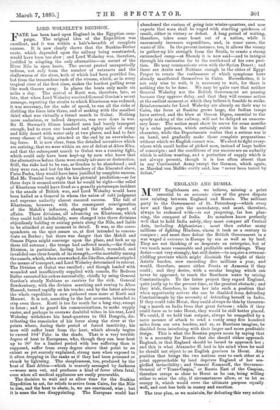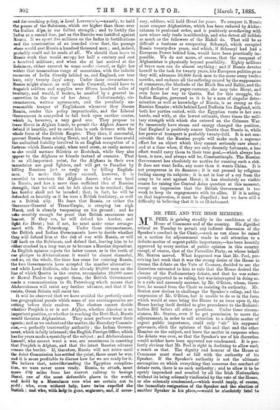ENGLAND AND RUSSIA.
MOST Englishmen are, we believe, missing a point essential to an accurate view of the grave dispute now existing between England and Russia. The militant party in the Government of St. Petersburg—which every now and then gets the ascendancy, and must, therefore, always be reckoned with—is not proposing, far less planning, the conquest of India. Its members know perfectly well that to hold India safely, they must conquer all Central Asia, including Afghanistan ; must then subdue many millions of fighting Hindoos, whom it took us a century to conquer ; and must then defeat the British Government in a war waged a outrance in Europe by sea as well as by land. They are not thinking of so desperate an enterprise, but of two much more reasonable and profitable undertakings. They desire—not very strongly, but still desire—to acquire a revenueyielding province which might diminish the weight of their • Asiatic burden, now exceeding five millions a year, and would, therefore, annex either Persia or Armenia if they could ; and they desire, with a secular longing which can never be appeased, to reach the Southern water by seizing Constantinople. To the latter project they regard England, quite justly up to the present time, as the greatest obstacle ; and they wish, therefore, to force her into such a position that when opportunity arrives she can be disabled from defending Constantinople by the necessity of defending herself in India. If they could take Herat, they could always do this by threatening a march on India from that great fortress • while if they could force us to take Herat, they would be still better placed. We could, if we held that outpost, always be compelled by a mere menace of attack to send a costly army five hundred miles from our own borders, and so, as Russians imagine, be disabled from interfering with their larger and more profitable . design. This is what the Russian papers mean by saying that it is a necessity for Russia that she should either approach England, or that England should be forced to approach her ; and this is what Alexander II. had in his mind when he said he should not object to an English garrison in Herat. Any position that brings the two nations near to each other at a point approachable by land deprives England of her seagirdled invincibility ; and General Komaroff, the GovernorGeneral of " Trans-Caspia," or Russia East of the Caspian, therefore creeps as close to Herat as he can, being willing either to seize the city, if circumstances allow, or to let us occupy it, which would serve the ultimate purpose equally well, and cost less both in money and exertion.
The true plan, as we maintain, for defeating this very astute and far-reaching palioy, it Lord Lawrence's,—namely, to hold the passes of the Iduleiman, which are higher than those over the Italian Alpe, in our fullest strength ; and to fortify the Lades as a second line, just as the Danube was fortified against Russia. If we spent five millions on the Indus in fortifications and the construotion of an ironclad river fleet, the passage 301.ene would cost Russia a hundred thousand men ; and, indeed, probably could not be made at all. We should then leave to Ennis. work that would occupy her half a century and cost a hundred millions ; and when she at last arrived at the Suleiman, either consent to some moth's rivendi, or fight her within that tremendous range of mountains, with the infinite resources of India directly behind us, and England, our true base, only twenty day.' away. Under those circumstances, Russia might almost as well invade Cornwall, would have to despatch soldiers and supplies over fifteen hundred miles of terzitory, and would, if beaten, be assailed by a general insurrection in the rear of her Army. Unfortunately, cirounistances, written agreements, and the peculiarly unreasonable temper of Englishmen whenever they discuss Russia, render this policy impracticable, and the Liberal Gevernment is compelled to fall back upon another course, which is, however, a very good one. They propose to have Herat in Afghan hands, to permit the Afghan Ameer to Wand it heartily, and to assist him in such defence with the whale force of the British Empire. They thus, if successful, prevent Russia from seizing Herat, and at the same time avoid the unlimited liability involved in an English occupation of a fortress which Russia could, when need arose, as easily menace aaahe could menace Silistria or Rustchuk, while they also appear to the Afghans as friends instead of enemies. That is an all-important point, for the Afghans in their own mountains are good fighters, and will get to Paradise by killing Russians ju.t as easily as by killing Englishmen. To make this policy succeed, however, it is essential to convince the Afghan Ameer, who was bred in Russia, and has a more than sufficient idea of Russian strength, that he will not be left alone to be crushed ; that his border shall not be invaded ; that, in fact, he will be defended as heartily as if he were a British feudatory, as well as a British ally. He fears that Russia, or rather the Gesernor-General of Trans-Caspia, is creeping too nigh Her* and is already trespassing on his ground ; and he asks sensibly enough for proof that British assurances are honest. If they are, he will defend his border, and fight for Herat ; but if not, he must make some arrangement with St. Petersburg. Under these circumstances, the British and Indian Governments have to decide whether they will defend him at the risk of war with Russia, or will fad back on the Suleiman, and defend that, leaving him to be either crushed in a long war, or to become a Russian dependent. As English opinion rejects the latter course, as in the teeth of oar pledges to Abdurrahman it would be almost shameful, and as, on the whole, the time has come for resisting Russia, the two Governments have accepted the manlier alternative ; and while Lord Dufferin, who has already 20,000 men on the line of which Quetta is the centre, accumulates 20,000 more at Rawul Pindee to support them, the British Government sends a communication to St. Petersburg which moans that Abdurrahman will resist any further advance, and that if he resists, Great Britain will resist too.
It will be observed that we have avoided the perfectly needless geographical puzzle which some of our contemporaries are setting before their readers. The electors cannot decide whether Penjdeh is or is not Afghan, whether Akrobat is an important position, or whether in reaching the Heri-Rud, Russia would threaten Afghanistan. They must perforce trust their agents; and as we understand the matter, the Boundary Commiesiona—a perfectly trustworthy authority ; the Indian Government, which is fully informed ; the English Foreign Office, which has for years made a specialty of the subject ; and Abdurrahman himself, who cannot want a war, are unanimous in asserting that Penjdeh is Afghan, and that the latest Russian advance creases the border. If, therefore, Russia will not retire until the mint Commission has settled the point, there must be war, and it is more profitable to discuss how far we are ready for it. We believe that, notwithstanding the Egyptian compliestie*, we were never more ready. Russia, to attack, must mews 400 miles from her nearest railway to besiege Herat, one of the most defensible places in the world, and held by. a Mussulman race who are certain not to yield ; who, even, without help, have twice expelled the' Baitialt ; and.wbo, with, help in guns, engineers, and, if neces sary, soldiers, will hold Herat for years. To conquer it, Russia must conquer Afghanistan, which has been reduced by Abdurrahman to profound order, and is positively overflowing with men whose only trade is soldiership, and who detest all infidels as much as the followers of the Mandi do. That will be as difficult a business as conquering Schamyl, which occupied Russia twenty-five years, and which, if Schamyl had had a European Power behind him, would have been practically impossible. We do not mean, of course, that the conquest of Afghanistan is physically beyond possibility. Eighty millions of brave men can do almost anything ; and if Russia devotes herself to the task for twenty years, lets European politics go as they will, advances 50,000 fresh men to the scene every twelve months, and endures all the suffering caused by the suppression of commerce, the blockade of the Black Sea and Baltic, and the rapid decline of her paper-currency, she may take Herat, and even force her way to Quetta. But for this struggle, the Indian Empire, governed as it is by a man of singular determination as well as knowledge of Russia, is as strong as the Russian Empire ; while behind Lord Dufferin lies England, with both her parties united, with the Egyptian route in her own hands, and with, at the lowest estimate, three times the military strength with which she entered on the Crimean War. So immensely have steam and energy changed the position, that England is positively nearer Quetta than Russia is, while her power of transport is probably twenty-fold. It is not conceivable that the Russian people will make such a supreme effort for an object which they cannot seriously care about ; and at a time when, if they are only decently fortunate, a less effort would carry them to their true goal,--which always has been, is now, and always will be, Constantinople. The Russian Government has absolutely no motive for running such a risk. It does not want India, any more than it wants China. It is not prosperous in its finances ; it is not pressed by religions feeling among its subjects ; it is not in fear of a cry from the army to be sent against Herat ; it has absolutely no visible reason for raising the Central Asian question at this moment, except an impression that the British Government is too weak to keep its engagements with its allies. If it is acting on that impression, it must be dispelled ; but we have still a difficulty in believing that it is so ill-informed.















































 Previous page
Previous page